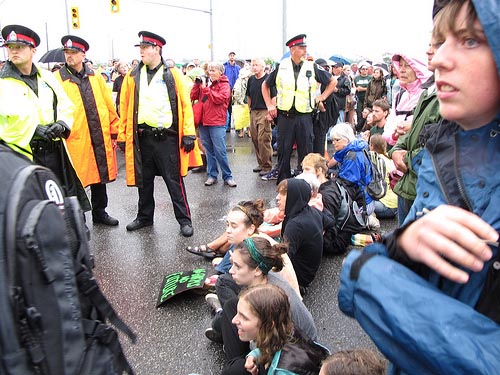Anyone who has fought to defend something of importance in this country — from a social program to a historic building — knows how difficult it is to be heard by the mainstream media. You get a smattering of attention, but generally media releases don’t garner much interest.
Now that 24 Kingstonians — ages 14 to 87 — have been thrown behind bars in Ontario for attempting to prevent the prize-winning dairy herd at the Frontenac Institution prison farm from being taken to auction, the cause has suddenly become newsworthy. Even CBC’s The National deigned to cover it Monday — instead of Tiger Woods, etc. — with about 10 seconds of video and a headline. If only they had all been willing to give the prison farm closures a thorough examination earlier — before it was too late.
I spent last Sunday near the rain-soaked frontlines of the blockade. After 18 months of lobbying, appearing before a Parliamentary Committee, going to court, organizing rallies and meetings — and trying to get media attention, members of the Save Our Prison Farms Campaign began to have heart-wrenching meetings about civil disobedience — blockading the farm entrances. Once we realized we had no alternative, we held two public training sessions, also advising people of their legal rights. We told supporters it was their choice whether to take part in the blockade and risk arrest or stand nearby and offer support.
As someone who spent time in Toronto’s Don Jail for one month years ago because of my politics, I decided to avoid the hideous experience of incarceration this time. When I first joined the demonstration Sunday at noon, along with about 500 others, I stayed on the corners across from the prison farm entrance. About 300 people formed a human barricade at the Frontenac Institution’s main entrance with the Kingston Police watching closely.
Campaign representatives had negotiated with city police ahead of time and there was a real attempt to find some common ground. But, when we were warned by a supporter keeping watch near the 401 Highway that the four tractor-trailers were approaching, tension began to rise. Protesters and police were almost silent as we all waited for the trucks to appear.
When they finally pulled up at the intersection across from the prison’s main entrance, a few of us ran up to the drivers’ windows begging them not to continue, explaining the issue. The driver of the first truck seemed genuinely torn, but soon demanded we leave him alone.
The police had told organizers that we would be allowed to stop the trucks for 10 minutes — as a kind of token gesture, but once the first truck rolled across the intersection (after two people had been pulled from its path and thrown in a police wagon) several protesters, sitting with linked arms on the cold, wet roadway, refused to move — and the police dragged off seven more. (It is important to note that people weren’t simply arrested for “breach of the peace” and then released, but “mischief.”)
The huge, unwieldy truck eventually backed up to its original position to clear the busy road — and thus began a four-hour stand-off during which we all gathered at the entrance, sharing warm, dry clothes, pizza, and hot drinks. Finally, after 6 p.m., the police gave their word that the trucks wouldn’t leave until we returned the next day and hundreds of weary, shivering Kingstonians went home.
Little did they know what awaited them when about 300 returned at 5:30 a.m. Monday. Two-hundred police, mainly OPP, including the tactical unit, were there ready to take on citizens of all ages. As during the G20, people coming near the main entrance were, according to one witness, “struck, tackled, and otherwise abused needlessly” by these men in black. There were 14 arrests Monday, as the tractor-trailers took out the dairy herd and chickens from this productive, century-old farm.
One of the chants we used on Sunday was “Shame, Shame, Harper’s To Blame.” What can a community do when the vast majority of its citizens support two of its key world-respected institutions, slated for closure by the federal government? (The greenhouses and composting facility at Pittsburgh Institution have already been closed.) The Kingston City Council voted unanimously in support of our prison farms. A few city counsellors took part in the protests.
The Kingston police and the OPP were doing the “dirty work” of a prime minister who was elected by just one in five potential voters. I’m sure that, as bail hearings for those arrested continue in this usually quiet city, citizens will be asking themselves many questions about what has happened here. The insult to our democratic interests has just been too blatant.
“As for the Save Our Prison Farms campaign, the sentiment is clear: “We have just begun!”
Kathleen O’Hara is a journalist who has worked in television, radio, and print. Her book Lost and Found in London will be out this fall. Her opinions stated in the above article do not reflect those of any organization.



